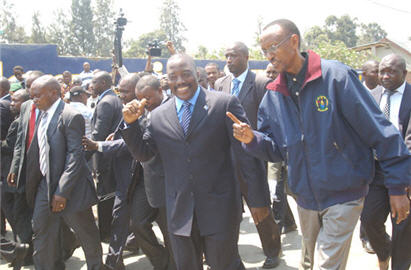
Secretary-General Ban Ki-moon has welcomed yesterday’s summit between the leaders of the Democratic Republic of the Congo (DRC) and Rwanda, the first official bilateral meeting since the neighbouring African nations broke off official ties more than one decade ago.
DRC President Joseph Kabila and Rwandan President Paul Kagame met in the city of Goma, in eastern DRC, in their first direct talks since 1996.
“The Secretary-General commends both leaders’ commitment to promote peace and stability in the Great Lakes region,” according to a statement issued by his spokesperson.
He also praised the joint military offensive launched early this year against the “destabilizing and threatening presence” in eastern DRC of the notorious ethnic Hutu militia known as the Democratic Liberation Forces of Rwanda (FDLR), which continues to perpetrate widespread killings and rapes of Congolese civilians.
In today’s statement, Mr. Ban said he is encouraged by the two presidents’ pledge to consolidate their relationship’s renewal through future meetings in the capitals of their respective countries.
“Security and development go hand in hand, and the Secretary-General hopes that the normalization of the relations between the DRC and Rwanda will contribute to the well-being of the people of both countries.”
Civilians are bearing the brunt of attempts to dismantle armed groups in the eastern Democratic Republic of the Congo (DRC), with the rebels carrying out vicious reprisals and some Government soldiers committing serious human rights abuses, the senior United Nations official to the country told the Security Council last month.
“We take these concerns very seriously and have addressed them with the Government at various levels,” said Alan Doss, the Secretary-General’s Special Representative and head of the UN mission in the DRC (MONUC).
He told the Council of the deployment of more MONUC resources and personnel to the affected provinces, such as North Kivu, continuing efforts to combat sexual and gender-based violence, and increased pressure on the Government to take action against undisciplined soldiers.
MONUC has set up nearly three dozen military bases in the embattled North Kivu province, many in remote areas where operations are ongoing against the FDLR. “These bases have allowed for close monitoring of the operations and rapid intervention in a number of instances.”
But Mr. Doss warned that the Mission’s resources are being stretched thin as it waits for reinforcements to arrive following the Security Council’s recent authorization of additional troops to deal with the strife in the DRC’s east.
The FDLR has been retaliating against civilians and attacking villages in North Kivu, committing rape and other human rights abuses which have forced hundreds of thousands of people from their homes, according to reports from the UN High Commissioner for Refugees (UNHCR).
The group has been operating in eastern DRC since the end of the 1994 Rwandan genocide that left around 800,000 Tutsis and moderate Hutus dead.
Related articles
- • DRC and Rwanda Sign Declaration of Principles for Peace in Eastern Congo (April 25, 2025)
- • European Union Sanctions Rwanda and M23 Officials over Congo Conflict (March 17, 2025)
- • Canada and Germany Impose Sanctions on Rwanda for Supporting M23 Rebels (March 4, 2025)
- • UK Suspends Financial Aid to Rwanda Over M23 Rebellion (February 25, 2025)
- • European Union Suspends Defence Consultations with Rwanda (February 24, 2025)
- • Tshisekedi Announces Government of National Unity and Calls for Unity Against M23 Rebels (February 23, 2025)
- • UN Security Council Calls on Rwanda to Stop Supporting M23 Rebels in DR Congo (February 22, 2025)
- • US Sanctions Rwanda's Minister James Kabarebe for Central Role in DR Congo Conflict (February 20, 2025)
- • Rwanda-Backed M23 Rebels Summarily Executed Children in Bukavu, UN Reports (February 19, 2025)
- • DR Congo Citizens Head to Polls to Elect President, Members of Parliament (December 20, 2023)
- • 'Deadly environment' plus 'political and social' obstacles hinder Ebola fight, Security Council hears (July 24, 2019)
- • Ebola outbreak declared an international Public Health Emergency (July 17, 2019)
- • Felix Tshisekedi Sworn In as DR Congo President (January 24, 2019)
- • Constitutional Court Declares Tshisekedi Winner of Presidential Election (January 19, 2019)
- • Felix Tshisekedi Vows to Be the President of All Congolese (January 10, 2019)
- • Felix Tshisekedi Elected DR Congo President (January 10, 2019)
- • DR Congo Delays Results of December Election (January 6, 2019)
- • Botswana Urges Joseph Kabila to Step Down (February 26, 2018)
- • No elections in DR Congo in December without electronic voting machines: INEC (February 13, 2018)
- • US Warns DR Congo Against Electronic Voting for Delayed Election (February 12, 2018)
- • Felix Tshisekedi accuses INEC of illegally prolonging Kabila's mandate (October 24, 2017)
- • DRC Seeks Arrest of Presidential Candidate Moise Katumbi (May 19, 2016)
- • Papa Wemba Is Buried in Kinshasa (May 4, 2016)
- • Papa Wemba Awarded Highest National Honor as Thousands Pay Tribute (May 2, 2016)
- • Peacekeepers, Congo Army to Resume Joint Fight Against Rwandan Rebels (January 28, 2016)
- • Political tensions 'running high' in DR Congo ahead of 2016 elections (October 7, 2015)
- • UN Report Blames Ugandan Islamists for 237 Killings in DR Congo (May 14, 2015)
- • Rights Groups: DR Congo Must Free Pro-democracy Activists (April 13, 2015)
- • DRC Army Putting Pressure on FDLR (April 1, 2015)
- • Police Open Fire on Crowd Protesting Election Law Change (January 19, 2015)







